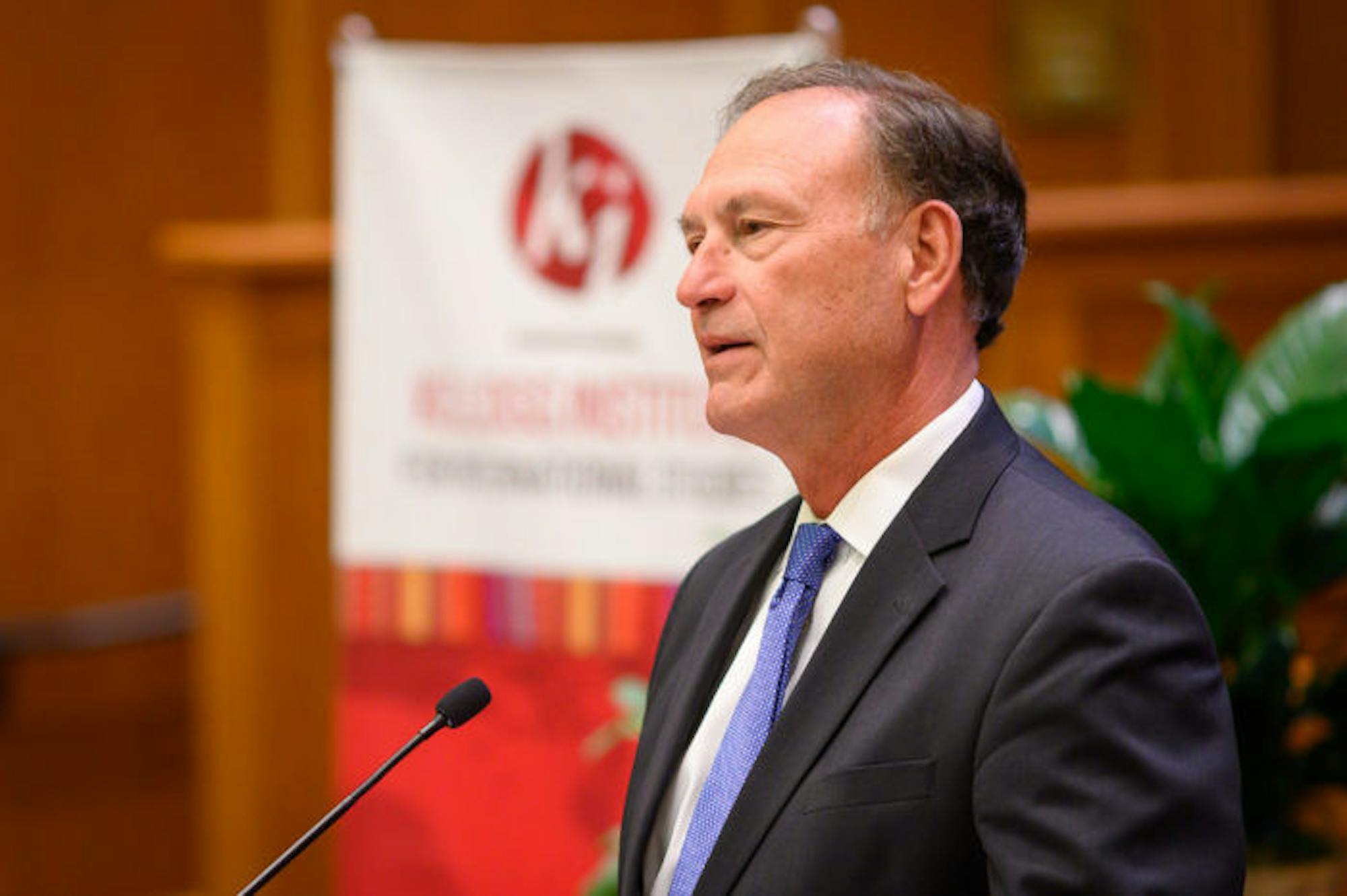Associate justice Samuel Alito defended the recent use of the U.S. Supreme Court’s emergency docket in a speech in the McCartan Courtroom at the Notre Dame Law School on Thursday afternoon. The emergency docket — sometimes referred to as the “shadow docket” — is a break from typical court procedure on merits cases that allows the court to address emergency applications before the party submitting the application suffers “irreparable harm.”
The court’s use of the emergency docket has come under public scrutiny recently following its decision to not block a new Texas law restricting abortions. Alito was part of a 5-4 majority that refused to issue an injunction pending appeal hours before Texas Senate Bill 8, which prohibits abortions after about six weeks or once a fetal heartbeat can be detected, was scheduled to go into effect Sept. 1. While the ruling did not grant an injunction, Alito noted it expressly called into question the constitutionality of the law. 
In addition to the recent Texas abortion case ruling, Alito cited two other recent cases that have drawn attention to the emergency docket. The first was the court's ruling to vacate a stay from a lower district court on the Center for Disease Control’s (CDC) issuance of an eviction moratorium in August. Alito, who Thursday condemned the “breathtaking scope” of the CDC’s eviction moratorium, was part of a 6-3 majority that issued an eight-page ruling vacating the stay.
The second case Alito mentioned was the court’s decision to refuse to block a district court’s ruling ordering the Biden administration to revive the Trump administration’s Migration Protection Protocols program. Alito said the acting solicitor general did not ask for the court to conduct an oral argument or receive a full briefing because it wanted relief within hours.
Alito said he finds criticisms of the substance of these rulings productive, but he finds recent media criticism of the court’s so-called “shadow docket” misleading.
“The truth of the matter is that there was nothing new or shadowy about the procedures we followed in those cases,” Alito said. “It’s hard to see how we could handle most emergency matters any differently. And despite all the recent criticism of the shadow docket, we have not seen many serious proposals setting out significantly different procedures that we could follow up.”
Alito added there is nothing new about emergency applications themselves, and the only changes that have occurred to the emergency docket of late are procedural. He highlighted two differences which he argued have improved the decision-making process.
The first difference Alito noted is the Internet allows justices to receive the filing party’s papers instantly and also to communicate with each other at any time of day. The second difference is almost all potentially controversial emergency applications are referred to and decided by the full court, Alito said. In prior years, only the single justice who was assigned to the circuit where the case arose would decide the case.
“Many generations of judges and scholars have thought that this standard is the best way to deal with this fundamental problem,” Alito said. “The Supreme Court and the lower federal courts have a lot of power, but here’s the power they do not have: they do not have the power to make the world stand still while litigation takes place.”
Alito compared the court’s use of the emergency docket to that of EMTs and emergency rooms treating victims immediately after an accident.
“You can’t expect the EMTs and the emergency rooms to do the same thing that a team of physicians and nurses will do when they are handling a matter where time is not of the essence in the same way,” Alito said.
He said a large majority of the court’s emergency applications are requests to stay, or temporarily suspend, the execution of a prisoner convicted of a capital offense. Alito said these types of applications are almost always submitted the day before or the day of the scheduled execution. Because of the time constraints commonly placed upon these types of rulings, the court generally does not have time for oral argument or to write a full opinion and instead does the most thorough job it can given the circumstances, Alito said.
“The catchy and sinister term ‘shadow docket’ has been used to portray the court as having been captured by a dangerous cabal that resorts to sneaky and improper methods to get its ways,” Alito said. “This portrayal feeds unprecedented efforts to intimidate the court or damage it as an independent institution.”
Alito said while there is nothing new about issuing a ruling without oral argument or a full opinion, one difference is the court has had to issue more emergency rulings in civil cases since the start of the Trump Administration. He attributed the increase to the significant amount of Trump-era initiatives enjoined by a district judge and challenges to election rules, prison safety and religious worship caused by COVID-19 policies.
Thursday’s lecture was the second appearance by a supreme court justice at Notre Dame this month following senior associate justice Clarence Thomas’ lecture at the Debartolo Performing Arts Center on Sept. 16.













